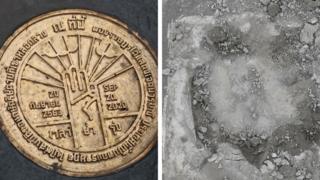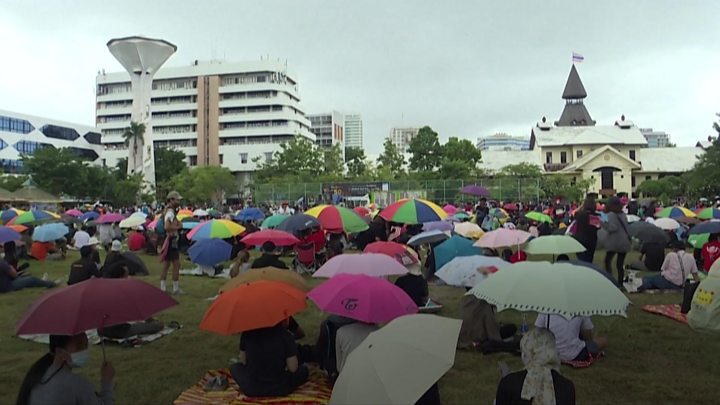Thai activists’ plaque for royal reform vanishes
 Image copyright Getty Images
Image copyright Getty Images A plaque laid by anti-government protesters declaring Thailand “belongs to the people, and not the king” has been removed.
Installed just a day earlier, it was seen as a bold act in a nation where criticising the monarchy can mean long prison terms.
It followed weeks of unprecedented protests calling for royal reforms and resignation of the prime minister.
Police said they were investigating the missing plaque, news agencies reported.
Bangkok’s deputy police chief Piya Tawichai also warned that they may charge the protesters who installed the plaque, according to Reuters.
- Thai activists challenge monarchy by laying plaque
- The student daring to challenge Thailand’s monarchy
On Saturday Bangkok saw some of its largest protests in years close to the Grand Palace, with thousands defying authorities to demand change.
The plaque was installed in the historic Sanam Luang field to the sound of cheers on Sunday morning, proclaiming in Thai: “The people have expressed the intention that this country belongs to the people, and not the king.”

Organisers said it was a replacement for another marking the end of absolute monarchy in the 1930s, which went missing in 2017.
Student-led protests first began in July against Thailand’s government.
These called for General Prayuth Chan-ocha, who seized power in 2014 and won disputed elections last year, to step down.
But the rallies took a staggering turn the following month when they began to include calls for reform to the monarchy.
The Thai royal family has long been shielded from criticism under draconian lese-majeste laws, which can see those accused punished with up to 15 years in jail.
In August protesters broke the taboo, and at one rally a 10-point call for reform to the monarchy was read out.
The plaque has quickly become a powerful symbol of Thailand’s democracy movement.
On social media some activists said they assumed it would be removed, and even before it was reported missing digital versions in pastels and rainbow hues were being widely shared.
It has “already been imprinted in the minds of many Thais”, wrote one Twitter user.





